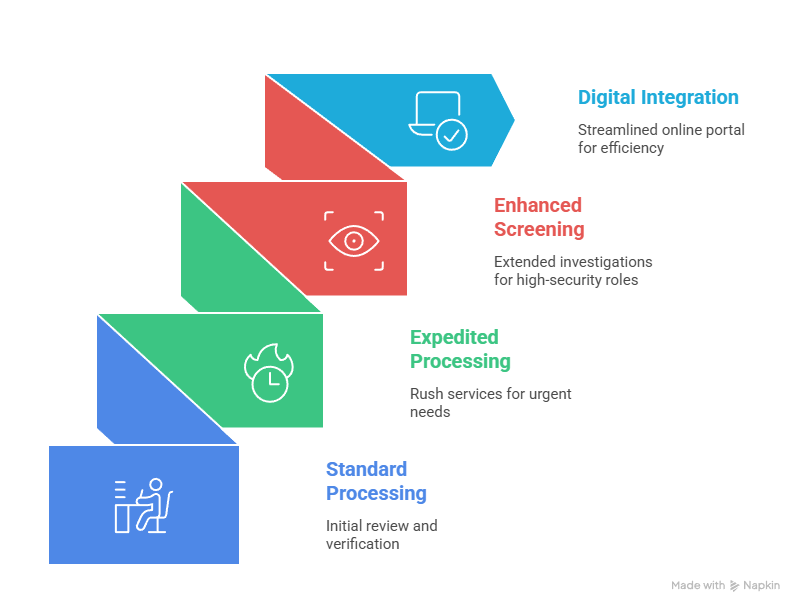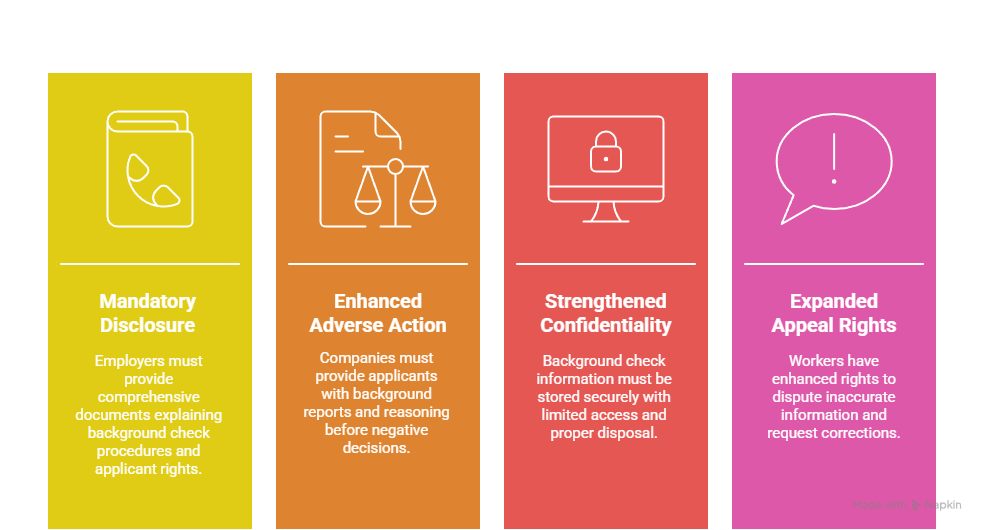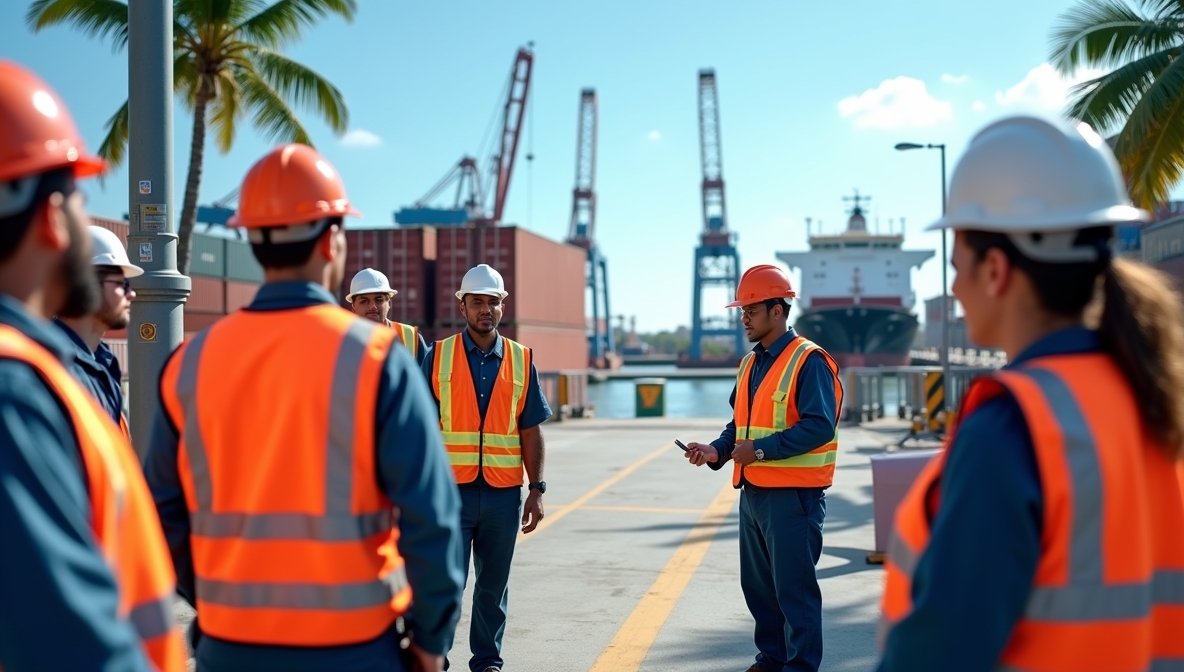Florida port worker background checks are comprehensive screenings required for maritime security positions at major ports including Miami, Tampa, and Jacksonville, involving federal TWIC card requirements, criminal history verification, and maritime-specific security clearances. These background checks typically take 4-8 weeks to complete and must comply with both federal Transportation Security Administration (TSA) standards and Florida state employment regulations.
Key Takeaways
- Florida port background checks require TWIC card certification through the Transportation Security Administration, which includes fingerprinting and criminal history review spanning seven years.
- Major Florida ports in Miami, Tampa, and Jacksonville each maintain specific additional screening requirements beyond federal mandates for dock workers and longshoremen positions.
- Disqualifying offenses include terrorism-related crimes, espionage, sedition, and certain felonies within the past seven years, though some violations may receive waivers through the appeals process.
- Processing times typically range from 30-60 business days for complete Florida port worker background screening, including TWIC card approval and state-specific employment verification.
- Renewal requirements occur every five years for TWIC cards, with continuous monitoring for new criminal activity or security violations throughout employment.
- Employment law compliance in Florida requires specific disclosure procedures and applicant rights notifications during the maritime background check process.
Understanding Florida Port Worker Background Check Requirements in 2025
Florida's maritime industry operates under strict federal security rules that have evolved significantly in recent years. The state's strategic coastal position makes it a critical shipping hub for international commerce. Port worker background checks combine TSA requirements with updated Florida employment laws. The process ensures workers meet enhanced national security standards. It also covers comprehensive local employment regulations. Background screening varies by port location and specific job type within maritime operations. Miami port background screening includes additional international trade security measures due to expanded Latin American shipping partnerships. This happens because of Miami's role as the primary gateway for Caribbean and South American cargo. Tampa and Jacksonville ports have implemented specialized requirements based on their unique cargo types and evolving security threat assessments.
Florida TWIC card requirements form the foundation of all port worker security checks. Federal screening must be completed successfully before state employment verification can begin. This dual-layer system ensures thorough worker vetting while maintaining strict legal compliance. Employers must navigate both federal and state regulatory systems effectively to maintain operational security and legal standing in 2025.
TWIC Card Application Process and Updated Criminal History Standards
Transportation Worker Identification Credentials serve as the primary gateway for Florida port employment eligibility in 2025. The TSA conducts comprehensive background investigations covering criminal history, immigration status, and potential security threats. Applicants must provide current documentation including birth certificates, Social Security cards, and valid government-issued identification. The application process requires mandatory in-person enrollment at designated TWIC centers throughout Florida. Applicants submit biometric data, complete detailed security questionnaires, and pay required processing fees during scheduled appointments.

- Standard processing timeline: Initial applications require 30-45 business days for federal database review, biometric verification, and security threat assessment completion by TSA investigators.
- Expedited processing options: Rush services available for urgent employment needs, reducing timeline to 15-20 business days with additional fees and employer verification requirements.
- Enhanced screening procedures: Certain positions require extended investigations lasting 60-90 business days, particularly for workers accessing high-security international cargo areas or passenger vessel operations.
- Digital application integration: New online portal systems streamline document submission and appointment scheduling, reducing administrative delays and improving applicant experience throughout the process.
Processing times have improved significantly with upgraded TSA systems implemented throughout 2024 and early 2025. Digital enhancements have reduced average wait times while maintaining thorough security review standards.
Criminal Disqualification Categories and Appeal Rights
Certain offenses result in permanent TWIC card disqualification under federal maritime security regulations. These include espionage, sedition, treason, and any terrorism-related criminal activity. Other crimes create temporary seven-year disqualification periods from conviction or prison release dates. Examples include fraud, bribery, smuggling, and unlawful weapons possession charges.
The TSA maintains strict interpretation of disqualification standards while offering structured appeals processes for applicants. Workers who believe their disqualifications were incorrectly applied can request formal reviews. Appeals typically require 60-90 days for complete investigation and final determination.
Required Documentation and Enrollment Procedures
Applicants must gather specific documents before scheduling TWIC enrollment appointments. Birth certificates or naturalization papers establish citizenship or legal residency status. Social Security cards verify identity and work authorization under federal employment laws. Current driver's licenses or state identification cards provide required photo identification for biometric comparison.
Additional documentation may be required based on individual circumstances and background complexity. Court records for resolved criminal cases help expedite processing and reduce investigation delays. Immigration papers for foreign-born applicants ensure proper status verification during federal database reviews.
Miami Port Background Screening Requirements for International Operations
Miami's position as the leading international gateway creates additional security layers beyond standard Florida port requirements. The port processes extensive cruise ship operations and handles diverse international cargo shipments daily. This volume requires enhanced background verification for workers accessing sensitive operational areas. Miami port background screening includes specialized checks for employees working in passenger vessel security and international trade compliance zones.
Enhanced security clearances examine foreign travel patterns, international business relationships, and potential exposure to security risks in global trade operations. The screening process typically adds 14-21 business days to standard background check timelines. Port of Miami coordinates closely with Customs and Border Protection during enhanced investigations. They also work with Immigration and Customs Enforcement to ensure comprehensive vetting while maintaining efficient processing for qualified candidates.
Specialized Clearances for High-Security Positions
Workers in Miami's international shipping operations often require security clearances beyond basic TWIC certification. These enhanced screenings examine detailed background elements specific to international commerce security. Investigators review foreign travel history, international business connections, and potential security vulnerabilities in global operations.
The process involves coordination between multiple federal agencies including CBP, ICE, and specialized maritime security units. Enhanced clearances can extend total processing time to 8-12 weeks depending on investigation complexity. Workers should plan accordingly when applying for positions requiring these additional security measures.
Comprehensive Background Check Components and Processing Timeline
Florida port worker background checks examine extensive databases and court jurisdictions to compile thorough criminal histories. The screening process includes federal criminal record systems, state court databases, and local law enforcement files across all states where applicants have lived or worked. Investigators verify information through multiple independent sources to ensure complete accuracy and legal compliance. International criminal history checks are mandatory for naturalized citizens or individuals with significant foreign residence history. These additional screenings can substantially extend processing timelines, particularly when requesting records from countries with limited information-sharing agreements with United States authorities.
| Investigation Component | Processing Time | Verification Sources |
| Federal Criminal Records | 5-10 business days | FBI databases, federal court systems |
| State Court Systems | 7-14 business days | All relevant state jurisdictions |
| Employment History | 10-15 business days | Previous employers, HR departments |
| Education Verification | 5-10 business days | Schools, certification bodies |
Employment verification involves contacting previous supervisors to confirm job dates, responsibilities, and departure circumstances. Educational institutions verify degrees, certifications, and training completion relevant to maritime positions. Professional licensing boards confirm current status and investigate any disciplinary actions against maritime-related credentials.
Criminal History Investigation Scope and Methods
Criminal background investigations follow strict federal guidelines established for maritime security positions. Investigators examine comprehensive court records, arrest reports, and conviction data from multiple jurisdictions nationwide. The process includes mandatory searches of terrorist watch lists and national security databases maintained by federal law enforcement agencies.
International record searches require coordination with foreign law enforcement agencies through established treaty agreements. These investigations can take 30-60 days depending on the countries involved and their cooperation levels. Applicants with extensive international backgrounds should expect longer processing times and may need to provide additional documentation.
Florida Employment Law Compliance and Enhanced Worker Rights Protection
Florida employment laws have been updated in 2024-2025 to establish clearer requirements for maritime background checks. Employers must provide detailed written disclosure about background check procedures before initiating any investigations. Written consent from applicants is mandatory before beginning comprehensive screening processes. The state requires specific notification procedures when making adverse employment decisions based on background check results. Enhanced anti-discrimination provisions protect applicants from unfair treatment based on arrest records without subsequent convictions. They also protect individuals with rehabilitated criminal histories outside statutory timeframes. Florida employers must demonstrate legitimate business necessity for employment decisions based on criminal history records. This requirement applies especially when offenses don't directly relate to port security responsibilities or specific job duties.

- Mandatory disclosure requirements: Employers must provide comprehensive standalone documents explaining all background check procedures, expected timelines, and detailed applicant rights information before obtaining written consent.
- Enhanced adverse action procedures: Companies must provide applicants with complete copies of background reports, federal rights summaries, and specific reasoning before making negative employment decisions.
- Strengthened confidentiality protections: Background check information must be stored in secure systems with strictly limited access to authorized personnel and proper disposal after legal retention periods.
- Expanded appeal rights: Workers have enhanced rights to dispute inaccurate information and request corrections through streamlined procedures with faster resolution timelines.
Regular compliance training for human resources personnel ensures consistent application of these updated legal requirements across all hiring decisions. Documentation of decision-making processes helps employers maintain compliance with evolving fair employment practice standards.
Worker Rights During Enhanced Background Screening Processes
Applicants have comprehensive rights throughout the Florida port background check process under updated 2025 regulations. They can request complete copies of all background reports used in hiring decisions within five business days. Workers can dispute incorrect information and demand corrections through established rapid-response procedures. They have the right to know specific information that led to negative employment decisions with detailed explanations.
Enhanced privacy protections strictly limit background check information access within hiring organizations. Workers can file complaints with state agencies if they believe their rights were violated during screening processes. Legal assistance programs have expanded availability through maritime worker advocacy organizations for complex discrimination cases.
Compliance Monitoring and Employer Responsibilities
Employers face increased oversight of their background check procedures under updated Florida employment regulations. State agencies conduct regular audits of hiring practices and background check compliance among major maritime employers. Companies must maintain detailed records of their decision-making processes and demonstrate consistent application of screening standards.
Training requirements for HR personnel have expanded to include updated legal compliance and worker rights protection. Employers must implement secure data handling procedures and establish clear protocols for handling disputed background information. Non-compliance can result in significant penalties and restrictions on hiring practices.
Renewal Requirements and Advanced Ongoing Security Monitoring Systems
TWIC card renewal occurs every five years and requires comprehensive updated background investigations. The renewal process typically moves faster than initial applications due to streamlined procedures implemented in 2024. However, significant life changes or new criminal activity can substantially complicate renewal processing. Florida port workers should initiate renewal applications 8-10 weeks before current credentials expire to prevent employment interruptions. Advanced continuous monitoring systems now track new arrests, security violations, and other disqualifying events among active TWIC cardholders throughout their employment periods. Port authorities receive real-time notifications of relevant incidents requiring immediate investigation or potential credential suspension. Employers get automated alerts about worker arrests, convictions, or security violations that may affect employment eligibility.
Workers must report new criminal activity, arrests, or security incidents to supervisors within 24-48 hours to maintain compliance. Security violations can result in immediate credential suspension pending investigation outcomes. Comprehensive appeal rights exist for workers facing credential revocation due to new information or changed circumstances.
Cost Structure and Expanded Financial Assistance Programs
| Fee Category | 2025 Amount | Available Financial Support |
| Initial TWIC Application | $129.75 | Military veteran reductions, port reimbursement programs |
| TWIC Renewal | $129.75 | Long-term employee assistance, union support funds |
| Enhanced Security Clearance | $75-150 | Workforce development grants, employer sponsorship |
The TWIC fee structure has been updated for 2025 with modest increases to cover enhanced security screening procedures. Military veterans continue receiving reduced rates with expanded eligibility criteria. Florida ports have increased reimbursement program availability to attract qualified workers in competitive job markets.
Processing delays or required appeals can create substantial additional costs through extended timelines and potential lost income. Comprehensive budget planning should account for these possibilities, particularly for workers transitioning from other industries into maritime careers. Understanding total cost implications helps both workers and employers plan effectively for complete background check requirements.
Maintaining Continuous Employment Compliance
Active port workers must follow strict ongoing compliance requirements beyond initial background screening approval. They must report any arrests, citations, or security incidents to employers within specified timeframes established by individual port authorities. Workers cannot access restricted port areas if their TWIC cards are suspended, under review, or approaching expiration dates.
Regular security training updates are now mandatory for all port workers, with frequency depending on specific job assignments and security clearance levels. Employers conduct periodic re-screening of workers in sensitive positions or those with access to high-security operational areas. Workers who fail to maintain ongoing compliance face immediate suspension from all port duties until issues are resolved.
Conclusion
Florida port worker background checks represent comprehensive screening systems that effectively balance federal security requirements with enhanced state employment protections in 2025. The integrated approach ensures qualified maritime workforce development while protecting both security interests and worker rights. Success in navigating these requirements depends on understanding updated timelines, preparing comprehensive documentation, and maintaining strict ongoing compliance with evolving regulations. Florida's major ports continue adapting their screening procedures to address emerging security challenges while creating employment opportunities in this essential industry sector that drives significant economic activity throughout the state.
Frequently Asked Questions
How long does a Florida port worker background check take to complete in 2025?
Florida port worker background checks typically require 30-60 business days for completion, including TWIC card processing, criminal history verification, and employment screening. Enhanced security clearances for international operations may extend timelines by an additional 2-4 weeks.
What crimes disqualify someone from working at Florida ports?
Permanent disqualifiers include espionage, sedition, treason, and terrorism-related offenses, while crimes like fraud, bribery, smuggling, and unlawful firearms possession create 7-year disqualification periods from conviction or release dates.
Do I need different background checks for Miami, Tampa, and Jacksonville ports?
While all Florida ports require federal TWIC card certification, each facility may have additional specific requirements based on their cargo types and security protocols, with Miami often requiring enhanced international trade screening.
How much does a Florida port worker background check cost in 2025?
The TWIC card application fee is $129.75, with additional costs varying by employer for comprehensive background screening services, though many ports and workforce development programs offer financial assistance or reimbursement.
Can I appeal a failed Florida port worker background check?
Yes, applicants can appeal TWIC card denials through the TSA appeals process and dispute inaccurate information in employment background checks through established correction procedures outlined in pre-adverse action notices.
How often do Florida port workers need to renew their background checks?
TWIC cards require renewal every five years with updated background screening, while port workers remain subject to continuous monitoring for new criminal activity or security violations throughout their employment period.
Additional Resources
- Transportation Security Administration TWIC Program Official Guide
https://www.tsa.gov/for-industry/twic - Florida Department of Economic Opportunity Maritime Career Resources
https://www.floridajobs.org/workforce-programs/maritime-careers - Port of Miami Employment and Security Requirements
https://www.miamidade.gov/portofmiami/employment.asp - Tampa Port Authority Career Opportunities and Background Check Guidelines
https://www.tampaport.com/careers - Jacksonville Port Authority (JAXPORT) Employment Information
https://www.jaxport.com/careers - Florida Fair Credit Reporting Act Compliance Guidelines
https://www.flsenate.gov/Laws/Statutes/2025/493.6106 - U.S. Customs and Border Protection Trade Careers in Florida
https://www.cbp.gov/careers/frontline-careers/cbpo - International Longshore and Warehouse Union Local Florida Chapters
https://www.ilwu.org/locals
Still have questions?
Get in touch with our team today for a personalized demo and discover how our tailored volume pricing and packages can drive results for your business!
How useful was this page?*
Note: your comments are anonymous. We use them to improve the website. Do not include any personal details.
Visit our FCRA Compliance Tool or leave a message here if you need a response.
From the blog Explore the GCheck Content Hub

How Long Does a Background Check Take? A Complete 2025 Guide
13 Dec, 2023 • 14 min read
The Ultimate Background Check Guide
13 Dec, 2023 • 4 min read
The Ultimate Guide to Employment Background Checks
13 Dec, 2023 • 10 min readThe information provided in this article is for general informational and educational purposes only and should not be construed as legal advice or a substitute for consultation with qualified legal counsel. While we strive to ensure accuracy, employment screening laws and regulations—including but not limited to the Fair Credit Reporting Act (FCRA), Equal Employment Opportunity Commission (EEOC) guidelines, state and local ban-the-box laws, industry-specific requirements, and other applicable federal, state, and local statutes—are subject to frequent changes, varying interpretations, and jurisdiction-specific applications that may affect their implementation in your organization. Employers and screening decision-makers are solely responsible for ensuring their background check policies, procedures, and practices comply with all applicable laws and regulations relevant to their specific industry, location, and circumstances. We strongly recommend consulting with qualified employment law attorneys and compliance professionals before making hiring, tenant screening, or other decisions based on background check information.

